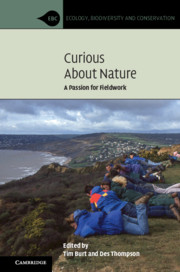Book contents
- Curious About Nature
- Ecology, Biodiversity and Conservation
- Curious About Nature
- Copyright page
- Dedication
- Contents
- Preface
- Foreword
- Part I Getting Curious About Nature
- 1 Fieldwork and Nature: Observing, Experimenting and Thinking
- 2 The Place of Field Studies in Environmental Science
- 3 The History of Fieldwork in the Geosciences
- 4 Pioneering Fieldwork Heroes in the Life Sciences
- 5 The Educational Benefits of Out-of-Classroom Learning
- Part II Essays: Inspiring Fieldwork
- Part III Reflections and Where Next for Field Studies
- Contributing Author Biographies
- Index
- References
5 - The Educational Benefits of Out-of-Classroom Learning
from Part I - Getting Curious About Nature
Published online by Cambridge University Press: 11 February 2020
- Curious About Nature
- Ecology, Biodiversity and Conservation
- Curious About Nature
- Copyright page
- Dedication
- Contents
- Preface
- Foreword
- Part I Getting Curious About Nature
- 1 Fieldwork and Nature: Observing, Experimenting and Thinking
- 2 The Place of Field Studies in Environmental Science
- 3 The History of Fieldwork in the Geosciences
- 4 Pioneering Fieldwork Heroes in the Life Sciences
- 5 The Educational Benefits of Out-of-Classroom Learning
- Part II Essays: Inspiring Fieldwork
- Part III Reflections and Where Next for Field Studies
- Contributing Author Biographies
- Index
- References
Summary
Fieldwork can be defined as any activity that involves leaving the school classroom, university lecture hall, laboratory or the confines of one’s own home and getting outside, for some purpose connected to learning. As with any definition, there are uncertainties at the edges. For example, what precisely is meant by ‘outside’? Can going round a large aquarium (when one is under a roof) count as fieldwork? I am not too bothered about providing a watertight definition; this is not a situation where the uncertainties are that important. Watching a computer simulation of river pollution, however well designed and educationally valuable, is not an example of fieldwork (though used before, after or even concurrently with fieldwork it may well help with learning). Determining the distribution of plants on a moorland (biology) is, as are mapping rock types in a location (physical geography or earth science), undertaking a survey of traffic in a city centre (human geography, sociology or social studies), asking people on a beach about their use of sunscreen (psychology) or surveying grave stones in a churchyard (history). To all intents and purposes, therefore, fieldwork can be equated with out-of-classroom learning, though the term is most often used in a way that implies being in the natural environment – without wanting to get into a long discussion about what is meant by ‘natural’, which I am not equating with ‘wilderness’.
- Type
- Chapter
- Information
- Curious about NatureA Passion for Fieldwork, pp. 116 - 130Publisher: Cambridge University PressPrint publication year: 2020
References
- 1
- Cited by

